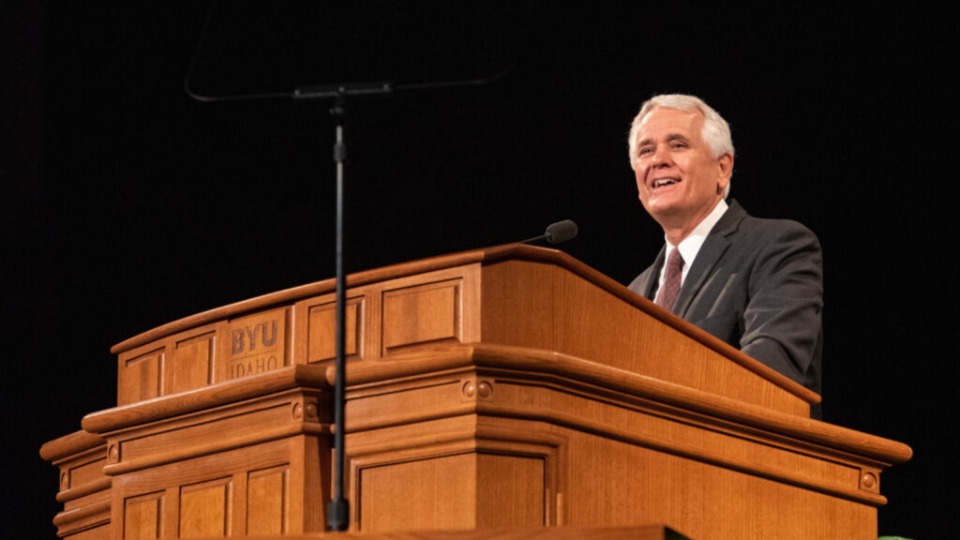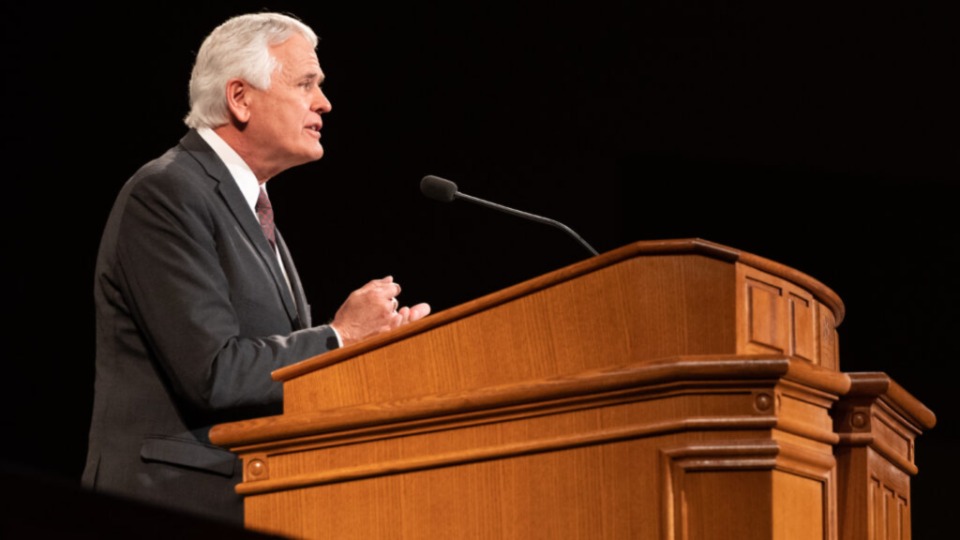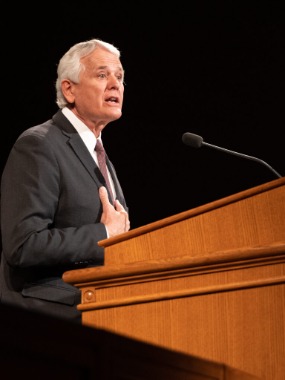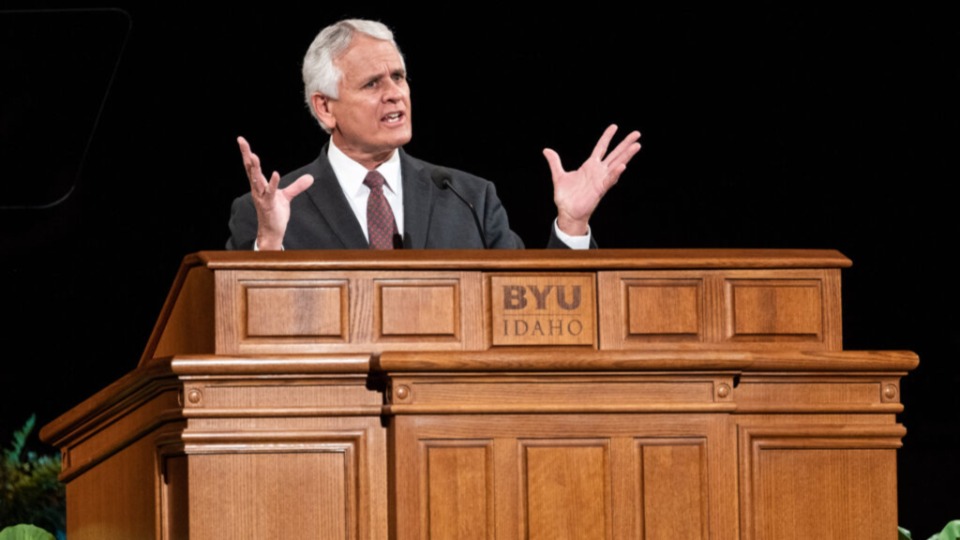
This story appears here courtesy of TheChurchNews.com. It is not for use by other media.
By Megan McKellar, Church News
Some years ago, Elder William K. Jackson, General Authority Seventy, was riding in an armored vehicle in Afghanistan when a suicide bomber slammed into his vehicle and detonated.
“I promise you from the bottom of my heart that there was no entry in my Franklin Day Planner a few years back scheduling an appointment with a suicide bomber,” he told BYU–Idaho students during a devotional on February 8. “All who survived were reminded of the fact that life doesn’t always go as we plan it.”
Unlike a novel in which one can thumb ahead to subsequent chapters or a theater in which previews of coming attractions are shown, life rarely provides any indication of what is coming next, Elder Jackson said. The unforeseeable and unanticipated can wreak havoc on personal plans.
“The truth is that opposition and obstacles and trials are not always earned by our actions. Although it is true that many of life’s wounds are indeed self-inflicted, sometimes we reap what we did not sow,” he taught.
Bad things happen to good people, but he does not believe it is always because “God wishes it so.” For the gift of agency to be of any value, opposition must exist. If all the righteous were protected while only the wicked were punished, then Heavenly Father’s plan would be “null and void.”
“This life would not test our strength, develop our character, provide us with opportunities to grow or allow us the use of agency.”

Instead, Heavenly Father allows some latitude for growth and development in this life. “He watches us with great interest. He has given us a lot of help,” Elder Jackson said. “I believe that He is saddened by our poor choices and elated by our victories. And, I believe, that sometimes He even intervenes. But He does not take our earthly test for us, nor has He predetermined all of our answers.”
Conquering and overcoming adversity increases confidence and builds character, and opposition provides an opportunity to “strengthen muscles we didn’t even know we had.”
During the Sermon on the Mount, the Savior taught about two men who each built a house, one on the rock and the other on the sand. “You will recall, that despite the wisdom of one and foolishness of the other, that both houses underwent a battering,” Elder Jackson pointed out. “Just because we follow Christ doesn’t ensure us immunity from trials. … We do not enter an ‘adversity protection program’ when we are baptized, but it does mean that we can receive the help to overcome it.”
The righteous are often asked to prove themselves in “a big way,” he said, offering Lehi from the Book of Mormon, Latter-day Saint pioneers, Joseph Smith and Joseph of Egypt as examples of this principle.
“It was fortunate that Joseph (of Egypt) never gave up just because it seemed that the gospel wasn’t working in his life. We don’t always know why, but we can be assured that something positive can, and will, result from our trials when we place our trust in God and follow His commandments, as did Joseph,” Elder Jackson said.
In an equestrian steeplechase, horses and riders are pitted against obstacles such as pools of water, jumps or hedges. The obstacles are not placed to discourage, injure or maim the animals, nor are they there to cause the horse and rider to crash; rather, they are put there to challenge the team. “When seen in such a light, obstacles in our own lives can be better understood. They are challenges to be hurdled.”
Being a member of the Church makes one a target of some of the adversary’s attention, Elder Jackson taught. “The adversary obviously considers you valuable, worthy of his efforts, and more importantly, not yet one of his fold. Mary Ellen Edmunds once wrote, ‘Opposition is evidence of the truth at work.’”

As he began his sophomore year at BYU, Elder Jackson began considering medical school programs. He discovered a program at Johns Hopkins University in Baltimore, Maryland, which accepted 25 students a year to be part of a five-year program that resulted in a Bachelor of Science and an M.D. degree. He committed to do what was necessary to be considered, which included enrolling in all of the prerequisite science courses at once and taking the medical school admission test, MCAT.
After the school year finished, he submitted his application and was selected as one of 60 finalists to be interviewed in Baltimore. As he began his interview with a panel of physicians and professors, one professor “zeroed in” on Elder Jackson’s missionary service and made accusations against him.
“I felt like I was on trial,” Elder Jackson recalled. “About all I could do was to bear my testimony and crawl back to Provo. I was certainly qualified, but did not get an invitation to join the elite class of 25. … It didn’t seem fair. My plans had not worked out. I felt I had been disqualified because of my faith.”
With encouragement from his wife, Ann, he brightened his outlook during his third year at BYU. He applied for medical school and received requests for interviews and acceptance letters, and chose to attend the University of California San Francisco medical school. Going to school in San Francisco resulted in lifelong friendships and far less debt and allowed him to live closer to home, and Elder Jackson graduated at the same time he would have if he was accepted to the Johns Hopkins University program.

Because he was not in any significant debt, he also had substantial freedom to choose where to go after his medical residency. “This opened up the opportunity for us to go overseas, something that would have been much less likely had I attended Johns Hopkins. Our overseas experiences, including the adoption of three children, blessed our lives in incalculable fashion. … How fortunate that I didn’t get ‘my way.’”
“We should not expect to get through our journey without some opposition, nor should we want to,” Elder Jackson said. “The race is not to the swift, or the battle to the strong, but to him or her who will endure to the end, who will never, ever quit.”
“There exists a plan for us, a purpose, authored by God, that is both beautiful and fair, and cannot be derailed by earthly cares or concerns … no matter what tomorrow may bring.”
Copyright 2021 Deseret News Publishing Company